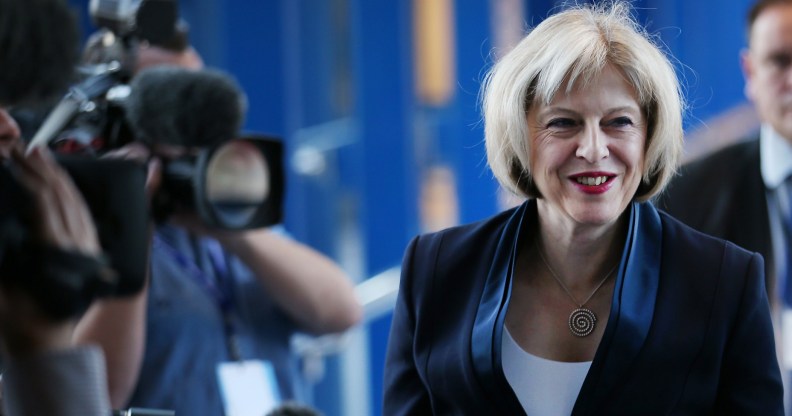Tories vote to block compulsory LGBT-inclusive sex education, but promise reform

Home Secretary Theresa May (Getty)
The Conservatives have blocked plans for compulsory LGBT-inclusive sex and relationship education in schools.
Education Secretary Justine Greening has repeatedly suggested she is open to reform on sex and relationship education, hinting last summer that the issue was near the top of her “in tray”.
An all-female group of MPs led by Labour’s Stella Creasy this week attempted to secure reform on the issue, tabling an amendment to the Children and Social Work Bill to make lessons on “sex and relationships education, same-sex relationships, sexual consent, sexual violence, and domestic violence” mandatory in all schools.
The law would require education watchdog Ofsted to evaluate school’s provisions on SRE as part of inspections, considering “whether the information provided to pupils is accurate and balanced, age-appropriate, inclusive, or religiously diverse”.
However, the amendment was shot down by the government in a public bill committee, where Tories held 10 of the 15 votes.
The vote was divided 10-5 down party lines, with all 10 of the Conservative MPs on the committee voting to block the SRE amendment, while all five Labour MPs supported it. No other party was represented on the bill committee.
The Conservative MP for North Dorset, Simon Hoare, said the amendment did not afford enough protections for faith schools who oppose homosexuality.
He said: “Some form of protection is needed for those who run faith schools, all faiths, to make the position absolutely clear. I have little or no doubt that I will receive emails from constituents who happen to read my remarks. They will say that this is all about promotion, and this or that religion thinks that homosexuality—or another element—is not right.
“To provide a legislative comfort blanket, for want of a better phrase, the new clause needs to include a clear statement that we are talking not about promotion, but about education, and where sex education is delivered in a faith school environment, those providing the education should not feel inhibited about answering questions such as “What is the thinking of our faith on this particular aspect of sexuality?”
Junior Education Minister Edward Timpson agreed with his concerns, saying: “We must attempt to allow everybody with a view a chance to make their case. It is a sensitive issue, as everyone is aware, but we want to ensure that we bring as many people with us as possible.”
Mr Timpson insisted that the government would be bringing forward its own plans on sex and relationship education, before himself voting to block the amendment, claiming “there are lots of repercussions that need to be thought through”.
He had said: “We hear the call for further action on PSHE and we have committed to exploring all the options to improve delivery of SRE and PSHE. We are actively looking at how best to address both the quality of delivery and accessibility to ensure that all children can be supported to develop positive, healthy relationships and to thrive in modern Britain today. We welcome the support in delivering this in a timely and considered manner.
“The Secretary of State herself has made this a personal priority, as we have heard, and we will be able to say more at a later stage in the Bill about how the Government intend to secure provision that is fit for purpose, inclusive and supports all young people growing up in our country today.
“We are unanimous that sexual harassment and sexual violence in schools in any form is unacceptable and should not be tolerated. We are much more alive to that and need to make sure that that is properly reflected in the way that we equip children in future.”
Ms Creasy rejected the government’s defence of existing frameworks, pointing to stats that 40% of schools are failing to provide adequate SRE.
She said: “At the moment, sex education is mandatory in terms of the biology of sex. In the biology curriculum, we teach young people about reproduction, but we do not teach them about relationships.
“That is where the risk comes in and where the gap in our safeguarding procedures exists. At the moment, we only have sex and relationship education across our schools in a very patchy way. Some schools are doing amazing work, and we should recognise that, but safeguarding only works if every young child has access to information, training and support.
“Ofsted found in 2013 that 40% of schools required improvement or were inadequate in their provision of sex and relationship education.
“That means millions of children in our schools right now are simply not getting the right sort of information about relationships, consent and sensitive issues such as their relationships with the other sex and with the same sex, domestic violence and abuse, female genital mutilation and forced marriage.”
HIV charity Terrence Higgins Trust said: “Another missed opportunity by the government to make SRE statutory in schools as Stella Creasy’s amendment is defeated. This is shameful.”
The MPs Maria Caulfield, Suella Fernandes, Simon Hoare, Seema Kennedy, Huw Merriman, Amanda Milling, Robert Syms, Edward Timpson, Michael Tomlinson, and Helen Whately voted down the amendment.
Education Secretary Justine Greening told Parliament in November that she was “considering all the options” on the issue – and has since come under pressure from campaigners and MPs to reform SRE to make guidance fit for the 21st century.

